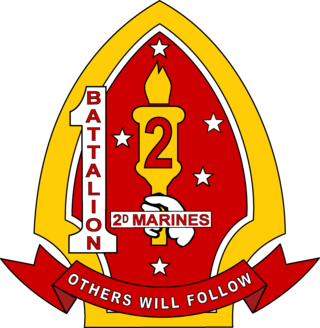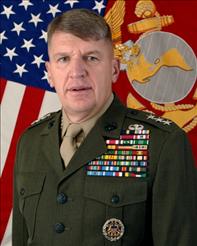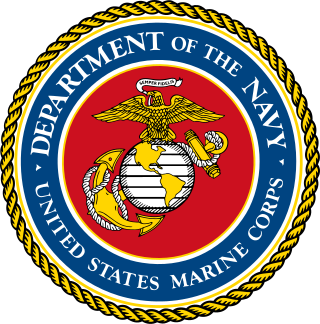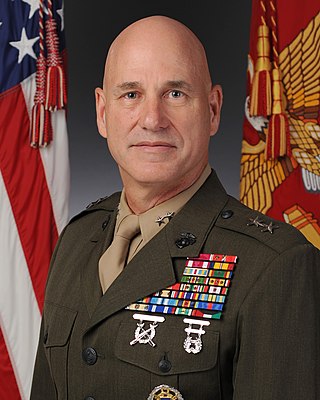
III Marine Expeditionary Force is a formation of the Marine Air-Ground Task Force of the United States Marine Corps. It is forward-deployed and able to rapidly conduct operations across the spectrum from humanitarian assistance and disaster relief (HA/DR) to amphibious assault and high-intensity combat.

The I Marine Expeditionary Force is a Marine Air Ground Task Force (MAGTF) of the United States Marine Corps primarily composed of the 1st Marine Division, 3rd Marine Aircraft Wing, and 1st Marine Logistics Group. It is based at Marine Corps Base Camp Pendleton.

The 5th Marine Regiment is an infantry regiment of the United States Marine Corps based at Marine Corps Base Camp Pendleton, California. It is the most highly decorated regiment in the Marine Corps and falls under the command of the 1st Marine Division and the I Marine Expeditionary Force.

The II Marine Expeditionary Force is a Marine Air-Ground Task Force consisting of ground, air and logistics forces capable of projecting offensive combat power ashore while sustaining itself in combat without external assistance for a period of 60 days. The II Marine Expeditionary Force is commanded by a lieutenant general, who serves under U.S. Marine Corps Forces Command, providing Marine fighting formations and units to European Command, Central Command and Southern Command.

The 7th Marine Regiment is an infantry regiment of the United States Marine Corps based at Marine Corps Air Ground Combat Center Twentynine Palms, California. Nicknamed the "Magnificent Seventh", the regiment falls under the command of the 1st Marine Division and the I Marine Expeditionary Force.

1st Battalion, 2nd Marines (1/2) is an infantry battalion in the United States Marine Corps based out of Marine Corps Base Camp Lejeune, North Carolina, consisting of approximately 900 Marines and sailors. The battalion, callsign "Typhoon'" falls under the command of the 2nd Marine Regiment and the 2nd Marine Division.

The 15th Marine Expeditionary Unit is one of seven such units currently in existence in the United States Marine Corps. The Marine Expeditionary Unit (MEU) is a Marine Air Ground Task Force (MAGTF) with a strength of about 2,200 personnel. The MEU consists of a command element, a reinforced infantry battalion, a composite helicopter squadron and a combat logistics battalion. The 15th MEU is currently based out of Marine Corps Base Camp Pendleton, California.

Richard F. Natonski is a retired United States Marine Corps lieutenant general whose last assignment was as the Commander of U.S. Marine Corps Forces Command. He assumed the post in August 2008, having previously served as the United States Marine Corps Deputy Commandant for Plans, Policies and Operations from 2006. He retired at Marine Barracks 8th & I on 8 September 2010.

The United StatesFleet Marine Forces (FMF) are combined general and special forces within the United States Department of the Navy that perform offensive amphibious or expeditionary warfare and defensive maritime employment. The Fleet Marine Forces provide the National Command Authority (NCA) with a responsive force that can conduct operations in any spectrum of conflict around the globe.

The United States Marine Corps is organized within the Department of the Navy, which is led by the Secretary of the Navy (SECNAV). The most senior Marine commissioned officer is the Commandant of the Marine Corps, responsible for organizing, recruiting, training, and equipping the Marine Corps so that it is ready for operation under the command of the unified combatant commanders. The Marine Corps is organized into four principal subdivisions: Headquarters Marine Corps, the Operating Forces, the Supporting Establishment, and the Marine Forces Reserve.

Combat Logistics Battalion 6 (CLB-6) is a logistics battalion of the United States Marine Corps. Nicknamed "Red Cloud," the unit is based at Marine Corps Base Camp Lejeune, North Carolina and fall under the command of Combat Logistics Regiment 2 and the 2nd Marine Logistics Group..

Lieutenant General Richard P. Mills is a retired United States Marine Corps officer, who served as commander of the Marine Forces Reserve from 2013 to 2015 and Marine Forces North, headquartered at the Marine Corps Support Facility New Orleans. Previously he was deputy commandant for combat development and integration and commanding general, Marine Corps Combat Development Command in Quantico, Virginia, and, prior to that assignment, was commander of the I Marine Expeditionary Force (Forward)/Regional Command Southwest in Afghanistan.

The September 2012 raid on Camp Bastion was a Taliban raid on Camp Bastion in Afghanistan's Helmand province on the night of 14 September 2012. The base hosted British, American, Danish and Tongan military personnel at the time of the attack. The Taliban fighters killed two U.S. Marines and destroyed or severely damaged eight U.S. Marine Corps AV-8B Harriers and a United States Air Force C-130 before the entire raiding force was killed or captured. The Taliban claimed that the raid was in response to the film, Innocence of Muslims, and have also stated that Prince Harry, who was stationed at the base at the time, was the target of the attack. To replace the aircraft lost in the attack, the USMC deployed 14 Harriers to Afghanistan 36 hours after the raid.

Gregg A. Sturdevant is a retired United States Marine Corps Major General. At the time of his retirement, he was the Director of Strategic Planning and Policy (J5) for U.S. Pacific Command. From February 2012 to February 2013, he commanded the Third Marine Aircraft Wing (Forward), which included U.S. Marine Corps aviation assets then located at Camp Leatherneck / Camp Bastion in Afghanistan.

Major General William Francis Mullen III was an officer in the United States Marine Corps. He last served as the commanding general for Training and Education Command. He was deployed in Fallujah, Iraq, in 2007 during Operation Iraqi Freedom. He co-wrote a book with Daniel Green called Fallujah Redux: The Anbar Awakening and the Struggle with Al-Qaeda.

David Hilberry Berger is a retired United States Marine Corps general who served as the 38th commandant of the Marine Corps from 2019 to 2023.

Eric M. Smith is a United States Marine Corps four-star general who has served as the 39th commandant of the Marine Corps since 22 September 2023. He served as acting commandant of the Marine Corps between 10 July 2023 and 22 September 2023 while awaiting Senate confirmation. Before nomination to the position he served as the 36th assistant commandant of the Marine Corps and before that as the deputy commandant for Combat Development and Integration, being succeeded by Karsten Heckl.

Mark Andrew Brilakis is a retired lieutenant general in the United States Marine Corps, who served as the Commander of United States Marine Corps Forces Command.

Paul W. Brier is a retired United States Marine Corps major general. A combat veteran of the Persian Gulf, Iraq, and Afghanistan wars, he retired on 31 December 2016, completing 36 years of military service. He holds a BS in Civil Engineering from the Virginia Military Institute and a Master of Strategic Studies from the U.S. Army War College. A 2012 CAPSTONE Fellow at the National Defense University, he is a graduate of the Defense Resources Management Institute, Naval Postgraduate School; Air War College; Joint Forces Staff College; and Marine Corps Command and Staff College.



















